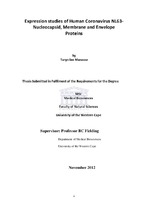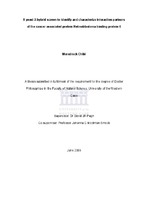Expression studies of human coronavirus nl63- nucleocapsid, membrane and envelope proteins
Abstract
Acute respiratory infections (ARI) continue to be the leading cause of acute illnesses
worldwide and remain the most important cause of infant and young children mortality. Many viruses such as rhinoviruses, influenza viruses, parainfluenza viruses, respiratory syncytial viruses, adenoviruses and coronaviruses are deemed to be the etiological agents responsible for ARI’s in children. The recently discovered coronaviruses HCoV-HKU1 and HCoV-NL63 contribute significantly to the
hospitalization of children with ARI’s. HCoV-NL63 was first identified in 2004, as the pathogen responsible for the hospitalization of a 7 month old child presenting with coryza, conjunctivitis and fever. Since then a significant amount of knowledge has been gained in the clinical spectrum on this virus, however HCoV-NL63 is still not well characterized on the molecular and proteomic level. This dissertation focuses on bringing about this characterization by cloning the HCoV-NL63 Nucleocapsid gene to be expressed in a bacterial system and transfecting the Nucleocapsid, Membrane and Envelope genes into a Mammalian cell culture system in order for its respective proteins to be expressed. With the use of Bioinformatic analytic tools certain characteristics of HCoV-NL63 Nucleocapsid, Membrane and Envelope proteins are able to be identified, as well as certain motifs and/or regions that are important in the functioning of these proteins. By comparing the results obtained for HCoV-NL63 N,M and E to other well studied coronavirus homologous will enlighten us on the potential role(s) of these proteins in determining HCoV-NL63 pathogenicity and infectivity. vi Although certain functions of these proteins can be deduced by the means of bioinformatics analysis, it is still imperative for it to be extensively characterized In Vitro. This will therefore form a fundamental step in the development of many other projects, which unfortunately fall outside the scope of this M.Sc thesis.
Collections
Related items
Showing items related by title, author, creator and subject.
-
A yeast 2-hybrid screen to identify and characterize interaction partners of the cancer associated protein retinoblastoma binding protein 6
Chibi, Moredreck (2009)Retinoblastoma binding protein 6 (RBBP6) is a 250 kDa protein that is implicated in mRNA processing and ubiquitination functions and has been shown to be highly up-regulated in a number of cancers. In humans and mice,RBBP6 ... -
Recombinant expression of the pRb- and p53-interacting domains from the human RBBP6 protein for in vitro binding studies
Ndabambi, Nonkululeko (University of the Western Cape, 2004)This thesis describes the cloning and recombinant expression of domains from the human RBBP6 protein for future in vitro binding studies with pRb and p53. RBBP6 is a splicing-associated protein that is known to interact ... -
A yeast 2-hybrid screen to identify and characterize interaction partners of the cancer associated protein Retinoblastoma binding protein 6
Chibi, Moredreck (University of the Western Cape, 2009)Retinoblastoma binding protein 6 (RBBP6) is a 250 kDa protein that is implicated in mRNA processing and ubiquitination functions and has been shown to be highly up-regulated in a number of cancers. In humans and mice, RBBP6 ...




